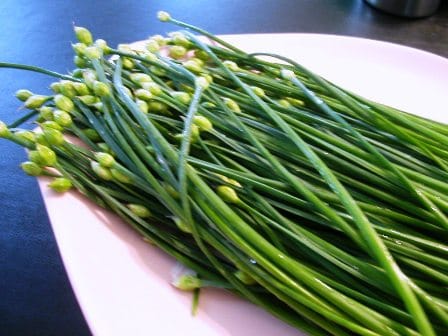Wasabi is a spice from the cabbage family. Its root is used as a spice and has a very strong flavor. The root is smashed up into paste for people to eat. Its hotness is more like hot mustard or horseradish than chili pepper because it irritates the nose more than the tongue. When too much is eaten, a very painful feeling will shoot up to your nose. The plant grows naturally in Japan. It is often eaten with sushi.
Wasabi needs clean water and cool climate. It is difficult to grow Wasabi. There are two ways to grow wasabi. One way grows wasabi in water. The other way grows wasabi in field.
When most people think of wasabi, they think of the fiery-hot, greenish paste served with their sushi or sashimi. But they’re probably eating extra hot Westernhorseradish, mixed with some soy sauce, hot Chinese mustard and a little greenfood coloring. Real wasabi is notoriously difficult to find, and expensive when it is found.
Wasabi is sometimes called Japanese horseradish, and its taste is very similar. Real wasabi — wasabia japonica — is a relative of the watercress family and an elusive little root. Like horseradish, it is a root, or rhizome, and it is grated or sliced for use in cooking. Wasabi is difficult to find because it is difficult to grow. It is expensive to buy because it is expensive to grow.
Health Benefits of Wasabi
Cancer protection
Wasabi is a rich source of chemicals known as isothiocyanates. These are the same anti-cancer chemicals found in broccoli and cabbage. These isothiocyanates appear to activate enzymes in the liver which detoxify cancer causing substances before they can do damage to the body. They also appear to interfere with other steps in the formation and metastasis of cancer cells. More importantly, they exert their anti-cancer effects without damaging normal cells.
Anti-inflammatory effects
The same isothiocyanates that give wasabi its cancer fighting capabilities also help to reduce inflammation by preventing platelet application. Researchers hope that wasabi may be used in the future to fight inflammation associated with such diseases as arthritis, asthma, and allergic reactions. More research is needed in this area.
Reduction in heart disease and stroke risk
Because wasabi inhibits platelet aggregation, it’s thought that it may reduce the risk of heart attack and stroke by preventing abnormal clot formation.
Anti-bacterial effects
Not only does wasabi appear to prevent inflammation, growth of tumors, and abnormal platelet clumping, it also has anti-bacterial properties. One study demonstrated its ability to stop the growth of certain strains of bacteria that cause food poisoning. So convincing is the evidence that companies have already started making wasabi based antibacterial hand washes. It’s also thought that wasabi can kill the bacteria that cause dental caries.

